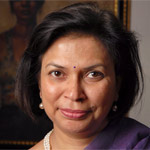Chemistry, domain knowledge key to winning new business says PR Guru panel
PR Guru
Does budget matter more than chemistry while pitching for new business? Read on for a rare primer from our expert PR Guru panel on putting together a winning pitch. #Longread.
Our panel includes...
Kunal Kishore Sinha, founder director, Value 360 Communications Pvt. Ltd.
Gayatri Rath, director, corporate communications and citizenship, Microsoft India
Deepa Thomas, general manager, group communications, Mahindra & Mahindra Ltd
Paroma Roy Chowdhury, vice president, public affairs –SoftBank
Sujit Patil, vice president and head of corporate communications Godrej Industries Limited and Associate companies
Shravani Dang, vice president & global group head of corporate communications at the Avantha Group
Aniruddha Atul Bhagwat, co-founder & director, Ideosphere Consulting Private Limited.
From a PR agency's perspective what should be the approach when pitching for PR support? Given the fact that there are budget concerns on both the client's and agency's side and the best needs to be delivered.
Arpita Kedia, Edelman
Expert Advice...
 Sujit Patil, vice president and head of corporate communications, Godrej Industries Limited and Associate companies
Sujit Patil, vice president and head of corporate communications, Godrej Industries Limited and Associate companies
“If I understand your question correctly; you are asking what should you as a PR agency demonstrate whilst pitching for an account. First of all, try and pitch to accounts that are serious about PR and have an issue or a challenge that they want to overcome. This will ensure that proper budgets and resources are in place. Having said that, your approach should be honest with a posture that demonstrates your service orientation, ability to listen and understand the business challenges.
Just to cite a real life example, we have rejected large celebrated agencies during the pitch process for the Godrej PR mandate as they came up with tactical yearly plan’s basis a single page brief without even understanding the real challenges. In today’s technology enabled world, the difference for me is really the people who would service my organization as an account. Do they bring the experience, knowledge, insights, and contacts that can enhance my PR effectiveness is the question I ask? Compelling story ideas can come out only if the relation is symbiotic and well embedded. The most critical parameter that I personally look at is their ability to integrate seamlessly with my organizational values and work in an interdependent manner.”
 Gayatri Rath, director, corporate communications and citizenship, Microsoft India
Gayatri Rath, director, corporate communications and citizenship, Microsoft India
“I look for understanding of our business and our industry. I also look for energy in the team and eagerness to work for us and with us. Last, but not the least, functional expertise – ability to find and document a story and then pitch it to media/influencers/analysts.”
 Kunal Kishore Sinha, founder director, Value 360 Communications
Kunal Kishore Sinha, founder director, Value 360 Communications
"A business makes the decision to take you on-board as its PR agency based on three key parameters. The first of these is domain knowledge. Any client looks for a thorough understanding of the industry and demonstrated success in campaigns carried out for other players in the same space. If you have domain expertise, half the battle is already won.
The next yardstick of judgment is your ability to understand the client’s requirements and offer actionable solutions. As a PR professional, one must identify the problem statement for the business and come up with an effective way to tackle it.
Lastly and most importantly, what makes or breaks the pitch is the way you interact with the client. If you’re able to establish a connection, put your finger on the pulse of their business and their ambitions and manage to project yourself as an agile solution provider, you will definitely cinch the deal, regardless of the agencies you are pitted against."
 Shravani Dang, vice president and global group head of corporate communications, Avantha Group
Shravani Dang, vice president and global group head of corporate communications, Avantha Group
“What is critical to a client during a PR agency pitch is the comfort and confidence that the PR agency and its team have the capability, ability as well as the agility to understand the clients and deliver consistently.
It is also important to communicate every team members’ strength as well as their responsibilities and the key person identified at whose desk “ the buck stops.” Also, show that the team works well as a team and in tandem and that they will go the extra mile and make a special effort to deliver and their mindset and culture is based on commitment. Always stress on what you can do and not so much as what you have done.
The other important thing is communicate that proactive and responsibility are part of the work ethic. If these are show cased properly, then budget is never a constraint. “
What key components are required to take a pitch from good to great. In my opinion, PR agencies need to get rid of presenting the same old story about earned, paid & owned media. I'm sure clients are aware of these concepts. What new pitch can we offer to win accounts?
Aahna Gandhi Gupta, PR Consultant
Expert Advice...
 Sujit Patil, vice president and head of corporate communications, Godrej Industries Limited and Associate companies
Sujit Patil, vice president and head of corporate communications, Godrej Industries Limited and Associate companies
“The PR requirements differ from organization to organization. Having said that, as a client, I would like to categorize my expectations in two buckets; behavioral and functional. If you observe well, functionally, most of the PR agencies are more or less at par. The services they can offer are almost the same, maybe differing case to case depending on the size of the operation. So what is the difference between an agency that keeps winning new accounts at its demanded price and the one that struggles to get an account even after offering ridiculous discounts. I guess it is the posture with which you pitch that takes your pitch from good to great. It is more to do with subtly demonstrated behaviors and as a client, I would certainly try to spot them. I would reckon that your pitch would work wonders if you are able to demonstrate service orientation, an inherent ability to listen and empathetically understand the client’s business challenges.
Most PR agencies are in a hurry to give quick solutions and that can sometimes backfire. I would use a PR pitch process to evaluate an agency’s ability to work in an interdependent manner, integrate with the in house teams and a get a solace that the agency can actually integrate seamlessly with my organizational values. Most agencies go full throttle on tactical capabilities, case studies, big coverages etc. I feel, investing some time on building “chemistry” with the client during the pitch process can make a significant difference.”
 Gayatri Rath, director, corporate communications and citizenship, Microsoft India
Gayatri Rath, director, corporate communications and citizenship, Microsoft India
“Having a good understanding of the client’s business and industry is always the most important part of a pitch. Most agencies do not spend enough time doing that. After you have understood the business recommending a good strategy to build the brand, change perceptions and tell the story will come easily.”
 Aniruddha Atul Bhagwat, founder-director, Ideosphere Consulting Private Limited
Aniruddha Atul Bhagwat, founder-director, Ideosphere Consulting Private Limited
There are tactical aspects such as earned, paid and owned media that need to be a staple in every good pitch, but what makes a pitch great is the story that the consultancy wants to tell. The way a consulting partner is able to pick apart the brand brief and using primary and secondary insights to build a narrative around the brand story is what makes a pitch unique and memorable. Using insights at the pitch stage provides justification and support to the ideas you are proposing and makes the strategy much more relevant to the audience the brand is looking to communicate to.
Apart from this, it is extremely importance to understand the business of the brand. Most consultancies will examine the business objectives, but if we can go one step deeper to understand the business, our communication approach will fit in much more seamlessly into the business vision and direction of the brand.
Concluding, a pitch will go from good to great if it includes, along with the communication tactical tools, a audience insights-led narrative, understanding of the business, and unique, yet realistic ideas with an effort to create communication relevance, engagement, and push consumer behavior towards to brand, either with their heart, brain, or even better, their wallet.”
How important is the budget while pitching to accounts? There are agencies with a fixed policy of charging a high amount. Shouldn't agencies consider pitching for 'the brand' rather than 'the money'?
Aahna Gandhi Gupta, PR Consultant
Expert Advice...
 Kunal Kishore Sinha, founder director, Value 360 Communications
Kunal Kishore Sinha, founder director, Value 360 Communications
“Speaking of budgets and brands, I strongly believe that the agency must be paid in correspondence to the work it will be putting in for any account. We should never under value our services in the hunger of working for a brand.
Similarly, we should not overcharge any business for our services. There have been cases where we have worked with big brands but their mandate has been limited in terms of geography or timelines. We have, therefore, adopted a dynamic pricing policy. At the end of the day, it’s not about the brand but the resources that we are allocating to an account. Payments must justify the effort and the man-hours spent. As an agency, we don’t believe in lowering the price simply because of the brand value of a potential client. Since we go the extra mile as brand custodians of whoever the client may be, we expect them to understand and respect the value of our work and to be ready to pay us concomitantly"
 Aniruddha Atul Bhagwat, founder-director, Ideosphere Consulting Private Limited
Aniruddha Atul Bhagwat, founder-director, Ideosphere Consulting Private Limited
“Communication consultancies should definitely pitch ‘the brand’ instead of ‘the money’, and I believe all agencies intend to pitch for the brand and do good work. Having said that, the approach of asking a prospective brand partner for budgets is to be able to pitch a feasible idea/s and strategy. Today, budgets of brands differ based on their objectives and their belief in each of the communication functions, and it becomes disappointing for any consulting team to work hard on structuring a great idea for it not see light of day due to budgets.
Further from a communication consultancy budgets perspective, there is much effort in terms of time and cost given to creating any strategy and pitch for a client, and if brands are willing to disclose budgets, it is great for consultancies to decide whether it is worth their time based on their budget benchmarks. In my opinion, opening up budgets not only help strategies/approach at the pitch stage become more realistic and feasible, but also avoids any waste of time between the consultancy and the prospective brand partner.”

If you enjoyed this article, you can subscribe for free to our weekly event and subscriber alerts.
Featured

PR professionals share their views on journalists publicly calling them out on story pitches

Auto blogger renders unconditional apology to Value 360 for defamatory posts

Hottest Indian startups of 2020, Paytm, Dreams 11 lead the charge: Wizikey Report




